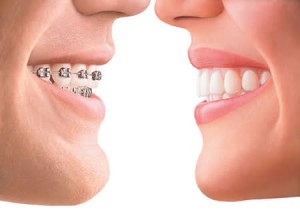Kids and adults alike often are treated with dental braces to correct misaligned teeth. The options for such treatment have increased dramatically in recent years, including some that avoid the uncomfortable metal braces common in the past. One such recent development is the Invisalign dental aligner. It is a plastic device that sits inside the mouth to reposition the teeth. As it has no metal parts, people with allergies to metals and alloys including stainless steel, nickel, and chromium may find this a major advantage. While it is not suitable for all tooth alignment problems, it is suitable for many patients. Invisalign has distinct advantages in the areas of comfort and appearance over conventional braces. Its removable design ensures that dental hygiene will not be impeded. As braces typically are worn for a year or more and often interfere with flossing and other dental care, this is a major advantage. After all, who wants to spend thousand of dollars on braces only to get cavities as a result?
Invisalign – A Seamless Fit For Your Lifestyle and Your Teeth
 Conventional vs. Invisalign braces
Conventional vs. Invisalign braces
The Invisalign dental aligner is one of the newest and most innovative products on the dental market today. The Invisalign aligner is essentially a plastic retainer that is shaped to guide the movement of one’s teeth into the correct position. Many patients today are now opting for Invisalign instead of metal braces, which have been common in the past.
The Invisalign treatment is the same as metal braces, in that it slowly, over time, aligns the teeth into their desired positions. Patients will receive more than one Invisalign aligner in this process so that the teeth are moved in stages. This allows for the best success in tooth alignment.
Read more…
Often one of the challenges of raising children is getting them to brush their teeth. Cavities are a common problem in children. While it is undisputed that brushing and flossing help reduce the number of cavities, actually getting your children to do this is often another matter entirely. Even if you succeed at getting your kids to stop fighting brushing their teeth and they learn to do their own dental hygiene well, you’re still typically stuck with kids and their love for sweet foods and juices feeding bacteria that damage their teeth.
A few months ago, I wrote an article that discussed a new development in oral health care that would help both kids and adults. My focus at the time was on the improvements for adults, but the same idea applies to kids, too. The article Mouth Probiotics Speed Canker Sore Healing and Reduce Cavities, Arthritis Pain, Heart Disease discusses the use of “oral probiotics” to seed the mouth with bacteria that reduce or prevent cavities and common ENT (ear, nose, throat) bacterial infections.
Mouth Probiotics Can Knock Out Harmful Bacteria
No matter how much you brush, floss, and rinse with dental solutions, you are still left with a mouthful of bacteria and many of those bacteria are harmful to your teeth. The basic idea of dental probiotic lozenges is that by chewing or dissolving a probiotic lozenge containing “friendly” oral bacteria such as Bacillus coagulans and Streptococcus salivarius, the bacterial flora in the mouth is shifted towards a higher percentage of bacteria that do not attack the body and in fact interfere with the growth of harmful bacteria.
Read more…
| Advanced Oral Hygiene, bacillus coagulans, cavities, cytokines, dental health, Health & Nutrition, inflammation, life extension, oral, oral health, oral probiotics, Streptococcus mutans, Streptococcus pyogenes, Streptococcus salivarius, Streptococcus sobrinus, teeth |
Here’s a new scientific finding to motivate your kids to brush their teeth and floss. Researchers have found that people who have poor dental hygiene are more likely to have impaired memory and mental functions. Now you can tell your babies that the reason grandpa can’t remember where he put his glasses is because he forgot to brush his teeth. When they question how that can be, you can explain it may be because nasty bacteria in his mouth are making his brain work worse.
Read more…





Recent Comments